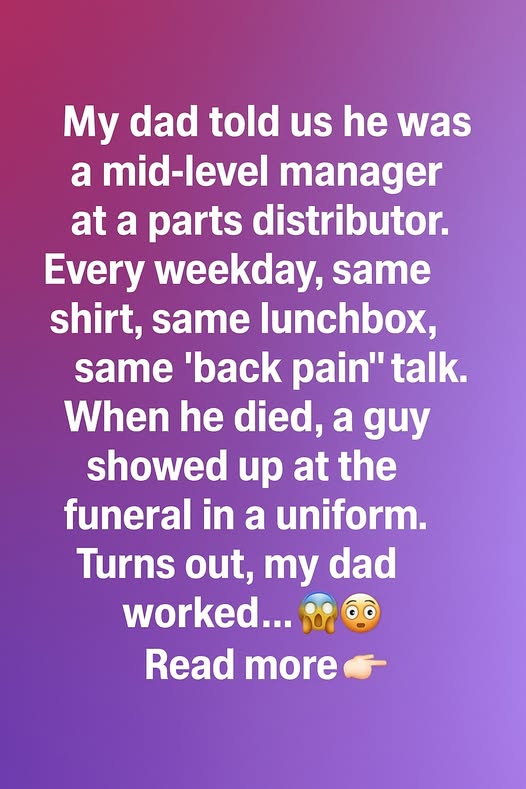The Secret My Dad Kept His Entire Life, And Why It Changed Everything
My dad lived his life in a way that made it easy to overlook the truth. Every morning, he left the house wearing the same button-down shirt, carrying the same dented lunchbox, offering the same small groans about his “back acting up again.” He told us he worked as a mid-level manager at a parts distribution company—nothing glamorous, nothing dramatic, just steady. He never brought home paperwork, never talked shop, never bragged. It all seemed normal. Predictable. Ordinary. And we believed every word of it.
When he died, the funeral was quiet—just close friends, family, and the usual murmurs of condolences. But then a man in a work uniform walked in, stood in the back for a while, and waited until things settled. When he approached us, he looked nervous, like he wasn’t sure if he belonged there. He introduced himself as a supervisor from Dad’s workplace. Only the workplace he described didn’t match the job title we had heard our whole lives.
My father wasn’t a manager. He wasn’t sitting behind a desk reviewing spreadsheets or giving presentations. He was the maintenance backbone of an entire facility—a man who repaired machines, fixed electrical problems, responded to emergencies, and kept everyone else’s workday from falling apart. This stranger—who wasn’t really a stranger to my father at all—said something that changed everything: “Your dad saved our day more times than I can count. He never wanted credit, but he deserved all of it.”
Hearing that felt like watching our dad’s life rearrange itself into a new shape, one that had always existed but had been hidden from view. Not to deceive us. Not out of shame. But to protect us from looking at his work the way the world sometimes does—judging jobs based on titles and paychecks instead of effort and integrity.
He didn’t think we’d understand. And maybe, as kids, we wouldn’t have. Maybe he feared we’d compare him to the fathers in suits we saw at school events. Maybe he thought we’d assume less of him. The irony is painful: he lowered his story so we could feel proud, when the truth was something far more admirable.
After the funeral, when the house grew quiet again, we began sorting through his things. In one of the storage boxes, shoved behind old winter coats, we found his real work jacket—a dark canvas uniform, worn thin at the elbows, stained with years of grease and dust. The pockets were frayed, the zipper stubborn. It smelled faintly of machine oil, the kind that seems permanent. Inside one of the pockets, folded into a soft square, was a note he had written to himself in small, blocky handwriting.
“Do good work. Leave things better than you found them. That’s enough.”
It stopped me cold. This little scrap of paper said more about who he was than any title ever could. He had lived by those words. You could feel it—through the stories the uniformed man told, through the quiet sacrifices Dad made that we never noticed, through the way he always seemed tired but never complained. He didn’t need applause. He didn’t need recognition. He just wanted to do right by people and go home at the end of the day knowing he had earned his sleep.
For years, I measured success the way most people do: promotions, awards, bigger houses, job titles that look impressive on business cards. Standing there holding his jacket, I realized how wrong I’d been. My father had built a legacy without a spotlight, without a corner office, without the kind of prestige people chase their whole lives. He built it with hard work that nobody saw, with consistency nobody celebrated, with kindness he didn’t advertise.
There was something devastating and beautiful about that. He carried a burden of humility that most people can’t even imagine. He believed his job made him “less than,” when the truth was that he was the kind of man any workplace is lucky to have—the kind who fixes problems quietly, supports others without fanfare, and takes pride in doing things the right way, not the easy way.
The more we learned, the more the pieces of his life clicked into place. The late nights he said were “meetings.” The tools he kept in the garage “just in case.” The way he always checked appliances, outlets, and machines without ever making it seem like a big deal. The back pain he brushed off—pain that was earned through years of lifting, climbing, bending, and working long after other people had gone home.
A few days later, we visited his workplace. People came up to us with stories—small moments that meant nothing to him at the time but stayed with them for years. The new hire he trained without judgment. The machine he fixed that saved an entire shift from shutting down. The coworker he drove home during a snowstorm. The Christmas bonuses he refused to take because “others need it more.” He never talked about any of it. He never wanted us to see the strain. He wanted to shield us from worry and let us believe his life was easier than it was.
But his real life was richer.
As I left the building, I realized that my dad had given his family something far greater than a title or a résumé to admire. He gave us a blueprint—one made of grit, quiet strength, and a belief that character is built in the small, unglamorous moments. He showed us that the value of a life isn’t measured in status, but in the way you move through the world, the way you treat people, the way you work even when nobody is watching.
He taught me that dignity never comes from the job—it comes from the heart behind it.
Now, when I think of legacy, I don’t picture trophies or achievements. I picture that worn work jacket, the handwritten note in his pocket, and the man who lived by a simple creed: do good work, help people, stay humble. If more people lived like that, the world would be a far better place.
My father didn’t leave behind a fancy title. He left behind something much greater: a life lived with purpose, kindness, and a quiet pride that didn’t need applause to be real.

